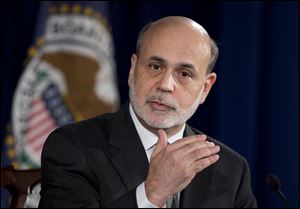
Bernanke 'cautiously optimistic' about U.S.
At UM, Fed chair talks of economic turmoil
1/15/2013
Federal Reserve Chairman Ben Bernanke.
ANN ARBOR — Fed chairman Ben Bernanke said Monday he believes the U.S. economy is “moving in the right direction, and I’m cautiously optimistic about the next few years.”
During a one-hour public chat at the University of Michigan’s Rackham Auditorium, the Fed chairman said recent efforts to avoid the so-called “fiscal cliff,” a series of automatic spending cuts and tax increases, were sufficient to prevent the country’s fragile economy from falling back into recession.
But Mr. Bernanke, chairman of the board of governors of the Federal Reserve System since 2006, added, “We are not out of the woods.”
The Fed chairman was a guest speaker at a question-and-answer session sponsored by the university’s Gerald R. Ford School of Public Policy. Among the range of topics he discussed were the fiscal cliff, the nation’s $1.1 trillion budget deficit, unemployment, inflation, and the looming political fight over the debt ceiling.
With the fiscal cliff issue resolved earlier this month, Mr. Bernanke said three big looming issues face the country: the budget deficit, the upcoming automatic sequester cuts, and the debt ceiling.
Of the three, the debt ceiling fight presents the most immediate threat, he said.
The last time Congress and President Obama fought over the debt ceiling — in the summer of 2011 — delays in authorizing more government spending ended up with the country’s credit rating being downgraded.
Mr. Bernanke likened the situation to a family in debt who decides to resolved their problem by refusing to pay their credit card bills.
“It’s not the best way to go about it,” he said.
The Fed chairman said, “It is very, very important for Congress to take necessary action to avoid a situation where the government doesn’t pay its bills.”
Mr. Bernanke added that it was not the role of the Fed to “play games” to induce Congress to resolve the debt ceiling.
“We’re going to do our job. Congress needs to do their job. Raising interest rates to force Congress to take action is not the way to go,” he said.
In discussing the overall role the Fed plays in aiding the economy, Mr. Bernanke said the Fed, which is the nation’s central banking system created 100 years ago and charged with maximizing employment and stablizing the nation’s monetary system, has moved the country toward greater stabilization of late.
It has brought short-term interest rates down to zero, and that in turn has helped the economy by bringing down mortgage rates that have helped revive the housing industry.
But Mr. Bernanke said unemployment rates remain too high at 7.8 percent nationally. “The pace of recovery has not been as strong as needed to improve the labor market,” he said.
While the Fed can’t move short-term interest rates any lower, the Fed still has some tools available to it to help move the economy forward, Mr. Bernanke said.
It could make another round of securities assets purchases — the Fed is buying $40 billion in mortgage-backed securities and $45 billion in Treasuries each month in a bid to push down borrowing costs and spark faster growth.
But it also could just use a communications strategy — issuing timely reports that indicate continued faith in the nation’s financial markets, Mr. Bernanke said.
“As far as I know, there’s no other methods that we have not tapped,” he said.
The Fed chairman said he would like to see a stronger labor market. But for now the Fed will just continue to evaluate the situation and assess the effects of its moves on the broader financial and labor markets.
Contact Jon Chavez at: jchavez@theblade.com or 419-724-6128.